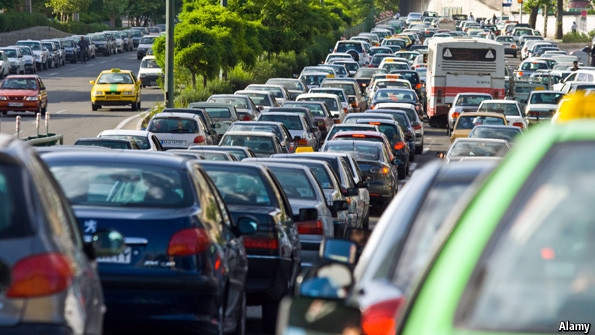 �PHASE two of the Iranian targeted subsidy plan� is as clunky in Persian as it is in English, but it rolls off every Iranian�s tongue. On April 28th President Hassan Rohani raised petrol prices by 75%, from 4,000 to 7,000 rials ($0.16 to $0.28) per litre. Increases in the price of staples are imminent, too.
�PHASE two of the Iranian targeted subsidy plan� is as clunky in Persian as it is in English, but it rolls off every Iranian�s tongue. On April 28th President Hassan Rohani raised petrol prices by 75%, from 4,000 to 7,000 rials ($0.16 to $0.28) per litre. Increases in the price of staples are imminent, too.This second round of cuts to the subsidies on petrol, gas and electricity, as well as on staples, was due in June 2012. But the former president, Mahmoud Ahmadinejad, repeatedly delayed it, thanks in part to a feud with the parliament. Although Mr Rohani�s cuts come at a time of slow economic growth and high inflation, both the state and the people support him more than his predecessor.
Like many oil-rich countries in the region that lavished funds on their people, Iran needs to cut the huge cost of subsidising its growing population of 77m. An estimated $40-100 billion is paid every year to keep Iranians, poor and rich, supplied with cheap energy, water, fuel and basic food. Consumption has soared. Shopkeepers in Tehran spray their verandas to drive away the dust. Cars clog the country�s roads. Iran�s energy consumption is reckoned to be 80% above the Middle East�s average. Worse, billions of dollars are squandered every year by smugglers taking Iran�s cheap fuel across borders to Iraq and Pakistan.
Iranians hope the subsidy reform will be done better than under Mr Ahmadinejad. In the first round of cuts in 2010, half the money saved was meant to be redistributed to the poor. But the government did not have good enough data to work out who should qualify. With the nation still reeling from the tumult following his disputed re-election in 2009, Mr Ahmadinejad handed the cash out to everyone. This ate into money earmarked for industry, so Iran�s oil, gas and petrochemical sectors, targeted by sanctions in 2012, accrued large debts. The sanctions also sent the rial crashing, causing huge inflation in Iran�s import-dominated economy.
This eroded two-thirds of the value of the monthly payments of 450,000 rials, today worth less than $17. �That can�t even buy a pair of Chinese-made boots for my son,� says Hamid, an unemployed father of six living in a two-room apartment in the suburbs of Isfahan. �I�d give up my payments if jobs came. But we still have sanctions so the jobs will never come.�
Earlier in April the president stopped all payments. Supported by famous Iranian actors and sports personalities, he asked richer Iranians not to reapply. But the government says only 3mpeople have forfeited their right to apply for a handout; nearly 73m have asked for it. Iran�s highest-ranking Shia clerics issued a fatwa saying that the claiming of payments by the rich is �religiously problematic�.
Mr Rohani has his compatriots on his side for the time being, but rising prices will not be tolerated only for long. The government is banking on reaching a deal with the West over its nuclear programme that would give Iran relief from sanctions. If that does not happen, both Iran and Mr Rohani�s credibility will suffer.
By The Economist
The Iran Project is not responsible for the content of quoted articles.











